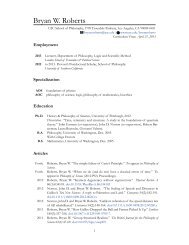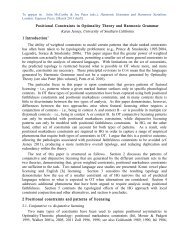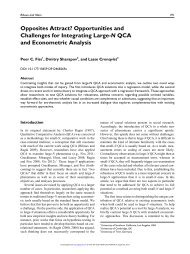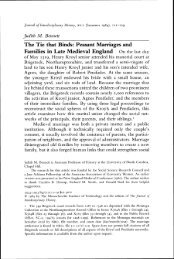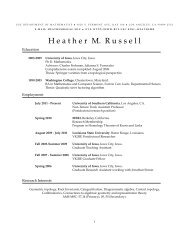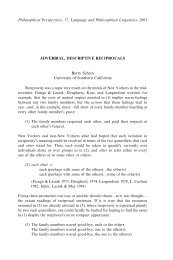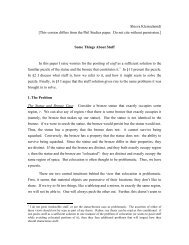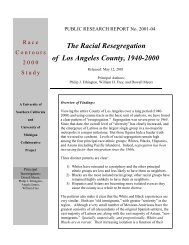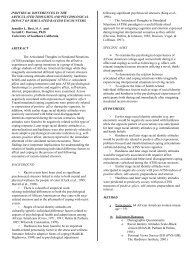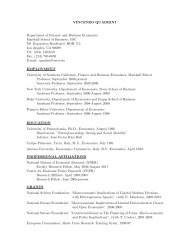The Diffusion of Ideas over Contested Terrain - Personal World Wide ...
The Diffusion of Ideas over Contested Terrain - Personal World Wide ...
The Diffusion of Ideas over Contested Terrain - Personal World Wide ...
Create successful ePaper yourself
Turn your PDF publications into a flip-book with our unique Google optimized e-Paper software.
#2144-ASQ V49 N4-December 2005—file: 49401-fiss<br />
by foreign trade, and such trade tends to make extensive use<br />
<strong>of</strong> bank services, thus tying corporations closely to their<br />
house banks (Francke and Hudson, 1984). For example, German<br />
firms have relied on credit to a far larger degree than<br />
firms in other countries (Edwards and Fischer, 1994).<br />
<strong>The</strong> important position <strong>of</strong> banks as financial intermediaries is<br />
also enhanced by the German system <strong>of</strong> universal banking.<br />
While the Anglo-Saxon banking system has tended to be<br />
highly segmented, German banks <strong>of</strong>fer a full range <strong>of</strong> banking<br />
services to their clients, ranging from taking deposits and<br />
handling payment transfer to credit financing for industry and<br />
trade. Most banks also deal in securities, although only a few<br />
large banks have underwritten public <strong>of</strong>ferings (Kempf, 1985).<br />
Traditionally, only very large German companies have made<br />
use <strong>of</strong> international capital markets, while the vast majority <strong>of</strong><br />
mid-size corporations—the Mittelstand—has relied almost<br />
entirely on credit financing, a tendency partly due to the legal<br />
hurdles that have discouraged smaller companies from issuing<br />
stock (Herrigel, 1996; Dore, 2000). As a result <strong>of</strong> this universal<br />
banking system and the reliance on credit financing,<br />
the German stock market has remained comparatively small<br />
in an international perspective and is frequently characterized<br />
as underdeveloped (e.g., Black and Moersch, 1998; Schmidt,<br />
Hackethal, and Tyrell, 2001). Debt-to-equity ratios <strong>of</strong> industrial<br />
firms tend to be about 50 percent higher than those in the<br />
United States or the United Kingdom (Schröder and Schrader,<br />
1998). Furthermore, unlike in the U.S., the market for corporate<br />
bonds has never been a true alternative for external corporate<br />
financing in Germany. High commissions payable for<br />
arranging bonds and cumbersome legal requirements provide<br />
strong disincentives for most corporations, making the market<br />
for corporate bonds practically non-existent (Kempf,<br />
1985). Although an alternative way <strong>of</strong> raising funds is through<br />
“certificates <strong>of</strong> indebtedness,” essentially, large loans that in<br />
many ways resemble bonds, only very large corporations are<br />
usually in the position to raise funds this way.<br />
Banks have also been the dominant representatives <strong>of</strong> shareholder<br />
interests in Germany. German banks control significant<br />
shareholdings in most <strong>of</strong> the largest German firms (Baums<br />
and Fraune, 1995). <strong>The</strong> banks’ control is further strengthened<br />
by the German “Depotstimmrecht,” a legal agreement that<br />
combines the votes <strong>of</strong> millions <strong>of</strong> small shareholders in the<br />
hands <strong>of</strong> a small number <strong>of</strong> banks in which these bearer<br />
shares are deposited. Traditionally, banks have been more<br />
interested in keeping large corporations as pr<strong>of</strong>itable debtors<br />
rather than taking the risk <strong>of</strong> losing them due to higher pr<strong>of</strong>it<br />
expectations. Ownership concentration has also tended to<br />
reduce the threat <strong>of</strong> hostile take<strong>over</strong>s, which are usually not<br />
possible without the support <strong>of</strong> banks and other incumbent<br />
blockholders, such as family owners and other firms. <strong>The</strong><br />
mergers and acquisitions that have taken place have mostly<br />
been friendly deals, as the representatives <strong>of</strong> different shareholders<br />
and managers meet again and again in the supervisory<br />
boards <strong>of</strong> large corporations and thus have an interest in<br />
continued cooperation (Schmidt, Hackethal, and Tyrell, 2001).<br />
<strong>The</strong> dense system <strong>of</strong> interlaced relationships, in combination<br />
with an extensive network <strong>of</strong> crossholdings—German com-<br />
504/ASQ, December 2004



